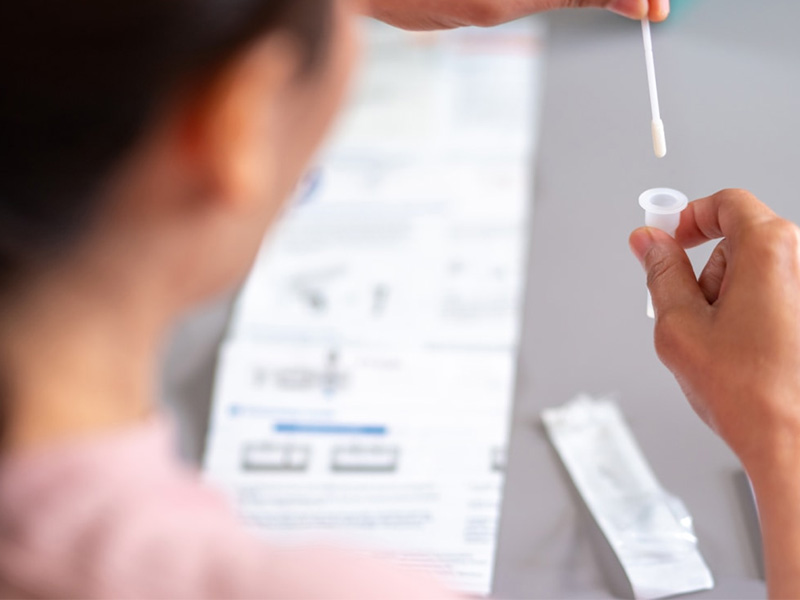Renal Injury Test Uncut Sheet
We offer uncut sheets for all our products, allowing for flexible customization and scalability.
Trust NewScen for reliable and efficient Renal Injury testing solutions.
List of Other Available Renal Injury Test Uncut Sheet
NewScen provides rapid diagnostic test uncut sheets for all our produced lateral flow assays. If the specific uncut sheet you require is not listed, please don’t hesitate to contact us for more details.
Understanding Our Target Audience






Please feel free to contact us immediately to request samples for your Uncut Sheet business before commencing the rapid test production.
FAQ
Microalbumin refers to the presence of small amounts of albumin, a protein, in the urine. The kidneys normally filter waste products, toxins, and excess substances from the blood, while retaining essential proteins such as albumin. However, when the kidneys are damaged or not functioning properly, they may allow albumin to leak into the urine, leading to an increased level of microalbumin.
Microalbuminuria is a term used to describe the presence of a slightly elevated level of albumin in the urine. It is an early sign of kidney damage, specifically damage to the filtering units of the kidneys called glomeruli. Normally, the kidneys filter out albumin and prevent it from being excreted in urine. When the glomeruli are damaged, they become more permeable, allowing small amounts of albumin to pass through.
Microalbuminuria is commonly associated with conditions such as diabetes and high blood pressure, both of which can lead to kidney damage over time. It serves as an important marker for early detection and monitoring of kidney disease in individuals with these conditions. Detecting microalbuminuria early can allow for interventions to slow down or prevent the progression of kidney disease.
Regular screening for microalbuminuria is often recommended for individuals with diabetes, high blood pressure, or other risk factors for kidney disease. Treatment and management strategies typically involve controlling the underlying condition causing the kidney damage, such as maintaining good blood glucose control in diabetes or managing blood pressure levels. Medications, lifestyle changes, and dietary modifications may also be prescribed to protect the kidneys and reduce albuminuria.
There are several tests commonly used to diagnose renal injury or assess kidney function. The specific tests recommended may vary depending on the suspected cause of injury and the clinical presentation of the individual. Here are some of the commonly used tests:
1. Blood tests:
Serum creatinine: This test measures the level of creatinine in the blood. Elevated creatinine levels indicate impaired kidney function.
Blood urea nitrogen (BUN): BUN is a measure of the amount of nitrogen in the blood that comes from urea, a waste product of protein metabolism. Elevated BUN levels can indicate kidney dysfunction.
Electrolyte levels: Blood tests may also measure levels of sodium, potassium, bicarbonate, and other electrolytes. Imbalances can occur in renal injury.
2. Urine tests:
Urinalysis: This test examines the physical and chemical properties of urine. It can detect the presence of blood, protein, glucose, and other substances that may indicate kidney damage.
Urine protein/albumin: Measurement of protein or albumin levels in urine can help identify kidney damage or dysfunction.
Urine sediment examination: Microscopic examination of urine sediment can reveal the presence of red blood cells, white blood cells, or casts, which may indicate renal injury.
3. Imaging tests:
Ultrasound: An ultrasound scan uses sound waves to create images of the kidneys and can help identify structural abnormalities or blockages.
CT scan or MRI: These imaging techniques provide detailed images of the kidneys, helping to identify tumors, cysts, or other abnormalities.
4. Renal biopsy:
In certain cases, a renal biopsy may be performed to obtain a small sample of kidney tissue for microscopic examination. It can help diagnose the specific cause and severity of renal injury.
It's important to note that the choice of tests depends on the individual's clinical presentation, medical history, and the suspected cause of renal injury. A healthcare professional, such as a nephrologist (kidney specialist), will determine the most appropriate tests based on the individual's specific situation.
There is no single "best" test for infection as it depends on the specific infection being targeted and the purpose of the test. Different tests, such as molecular tests (PCR), serological tests, antigen tests, or culture tests, may be more suitable depending on the circumstances.
There are several renal function tests that are commonly used to assess the health and functioning of the kidneys. Here are three major renal function tests:
1. Blood Urea Nitrogen (BUN) Test: The BUN test measures the level of urea nitrogen in the blood. Urea is a waste product formed in the liver as a result of protein metabolism and is excreted by the kidneys. The BUN test helps evaluate how well the kidneys are filtering and removing urea from the bloodstream. Elevated BUN levels may indicate impaired kidney function, dehydration, or other conditions affecting the kidneys.
2. Serum Creatinine Test: The serum creatinine test measures the level of creatinine in the blood. Creatinine is a waste product produced by the muscles through the breakdown of a compound called creatine. Healthy kidneys filter creatinine out of the blood and excrete it in the urine. An elevated serum creatinine level indicates impaired kidney function since the kidneys are not effectively clearing creatinine from the bloodstream.
3. Glomerular Filtration Rate (GFR) Test: The GFR test is considered the most accurate measure of kidney function. It estimates how efficiently the kidneys filter waste from the blood by calculating the rate at which blood is being filtered through the glomeruli (tiny blood vessels in the kidneys). GFR is usually estimated using equations that take into account factors such as serum creatinine levels, age, gender, and race. A lower GFR value indicates decreased kidney function, and it is used to classify the severity of chronic kidney disease.
These tests, along with other diagnostic tools and clinical evaluation, help healthcare providers assess kidney function, diagnose kidney diseases, and monitor the progression of kidney disorders. It's important to note that the interpretation of these tests should be done by a qualified healthcare professional in the context of the individual's medical history and other clinical findings.
Urinalysis. Your doctor will take a urine sample to detect and manage a wide range of disorders, such as urinary tract infections or kidney disease, to determine the underlying cause of AKI. Blood tests. Your doctor might take blood tests to find levels of creatinine or urea nitrogen, among other things.
